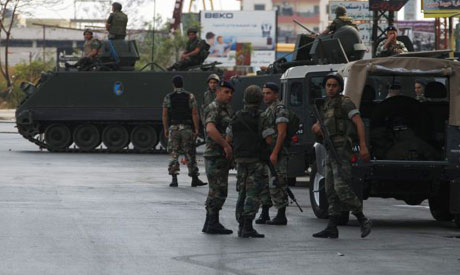
Lebanon's army (Photo: Reuters)
A body believed to be that of a Lebanese soldier kidnapped and decapitated by jihadists has been transferred to authorities for DNA testing, a security source said on Monday.
The man is thought to be Ali al-Sayed, a soldier kidnapped by militants in the eastern town of Arsal last month.
In a video posted on the Internet, jihadists claimed to have decapitated him.
A spokesman for the Lebanese army confirmed that "the body of a soldier has been transferred and DNA testing will be done at the military hospital in Beirut".
But the military declined to give any details about the suspected identity of the dead man.
Members of Sayed's family confirmed to AFP that relatives had been summoned to the military hospital in Beirut to provide DNA for testing.
A video purporting to show Sayed being beheaded by jihadists emerged last week, but the army said it was still investigating and could not confirm if the footage was of Sayed, or whether it was authentic.
In the video, the uniformed man is identified as Ali al-Sayed and presented as a Lebanese soldier among those abducted on August 2 as clashes erupted in Arsal, which lies on the Syrian border.
The footage shows the man sitting on the ground with three armed and masked men around him.
He becomes visibly scared when one of the three announces that he is to be killed, and is then beheaded to cries of "Islamic State!"
The Islamic State jihadist group and other jihadists overran the town of Arsal in clashes that began in August after the arrest of a Syrian accused of belonging to an extremist group.
Twenty soldiers, dozens of jihadists and 16 civilians were killed in the fighting that ended after mediation by Sunni Lebanese clerics.
After the truce, the militants, believed to be from the Islamic State as well as Al-Qaeda's Syrian affiliate Al-Nusra Front, withdrew from Arsal.
But they have continued to hold more than a dozen soldiers and police taken hostage during the fighting.
The militants have reportedly sought to negotiate the release of the hostages in exchange for Islamist prisoners held in Lebanese jails.
The fighting in Arsal was the most serious border incident since the conflict in Syria began in March 2011.
The violence has regularly spilled over into Lebanon, however, raising tensions between Sunnis who broadly back the uprising against Syria's President Bashar al-Assad, and Shiites, who support his government.
Families of the remaining soldiers and police hostages have blocked roads in Lebanon in a bid to pressure the government to secure the release of their relatives.
Short link: